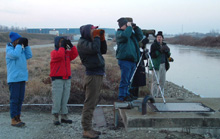 | Wednesday, January 5, 2005 |
|
Wednesday, January 5 11:00 a.m. Fermilab ILC R&D Meeting - 1 West Speaker: N. Mokhov, Fermilab Title: Beam Collimation and Machine-Detector Interface 3:30 p.m. DIRECTOR'S COFFEE BREAK - 2nd Flr X-Over 4:00 FERMILAB COLLOQUIUM CANCELED
Thursday, January 6 |
|
Wednesday, January 5 Vegetable Beef Santa Fe Black Bean Quarter Pound Hot Dog in a Soft Pretzel Roll $4.75 Turkey A La King Over Biscuit $3.75 Country Fried Steak w/Pepper Gravy $3.75 Assorted Personal Sized Pizzas $3.25 Beef & Cheddar Panini w/Sauteed Onions $4.75 Cavatappi Pasta w/Italian Sausage & Tomato Ragu $4.75
Wilson Hall Cafe Menu |
|
Extended Forecast |
Secon Level 3 |
| Fermilab Today is online at: http://www.fnal.gov/today/ Send comments and suggestions to today@fnal.gov Fermilab Today archive Fermilab Today PDF Version Fermilab Result of the Week archive Fermilab Safety Tip of the Week archive Linear Collider News archive Fermilab Today classifieds Subscribe/Unsubscribe to |
|
DZero Elects Terry Wyatt as New Co-spokesperson The members of the DZero collaboration have chosen Professor Terry Wyatt of the University of Manchester as their new spokesperson on November 30. Wyatt joins Jerry Blazey on the job, taking over from John Womersley, who has recently become a scientific advisor to the DOE. Wyatt has been a
"Being a DZero spokesperson is a more than full-time job," Wyatt said, adding that he is shedding all other responsibilities to concentrate on the new job. "Hopefully my colleagues will understand that it will take me a few months to get fully up to speed," he said. At the top of the collaboration's agenda during the first year of Wyatt's appointment will be upgrades to the detector's silicon tracker and trigger, to keep up with the machine's planned luminosity increase, he said. Plans for the longer term include upgrades that would allow the detector to record and process up to 150 events per second, three times the current capacity. "It's a real challenge for the collaboration to prepare thoroughly for these upgrades - whilst at the same time we have to continue to operate efficiently our current detector, re-process our entire current dataset offsite using Grid techniques, and continue our ambitious program of physics analyses," he said.
A project with 650 scientists and engineers from virtually every continent
can be complex but also engrossing to manage. "We obviously have different
ways of working, but because we share a common aim, that transcends our
differences," Wyatt said. "It's a fantastic feeling when it works well -
and with the performance of both the Tevatron accelerator and the DZero
detector still on an upward trend the potential rewards are enormous."
|
|
From The Guardian, January 4, 2004 Out of the Equation Even the brightest pupils aren't choosing to do physics at A-level these days. It's not surprising. They are highly unlikely ever to have met a physics graduate at school. As Einstein year begins, John Crace reports on a growing crisis.
Imagine trying to understand the nature of the universe without a grasp
of the laws of physics. Imagine making sense of nanotechnology without
knowing the basics of particle physics. You can't. From the vast to the
very small, from the visible to the invisible, physics underpins everything.
The more we know, the more fundamental it becomes. The distinctions between
the three sciences are increasingly blurred around the edges, with physics
underpinning and driving most of the advances in chemistry and biology.
Like it or not, it has become the senior science.
|
|
Christmas Bird Count
Heats Up With Warming Trend | ||
| ||
|
The temperature reached a high in the mid-20s on Saturday, December 18,
but that didn't stop the birds from coming out, and neither did it stop
120 bird counters from spending the day admiring and tallying those Christmas
birds.
"It wasn't really that cold," said Peter Kasper of Fermilab's Accelerator Division, who helped organize the annual event. "It's been colder, and it's snowed some years… but we have never had a blizzard before, though I expect that would make things difficult." However, Kasper doesn't predict a blizzard any year soon; in fact, he has seen a trend in the opposite direction, by the name of global warming. "Only in the past few years have we seen birds such as the Great Heron and the American Robin during this season," he said. "They are a few of the species that no longer migrate south, but instead winter here due to global warming." He encourages people to look at the Christmas Bird Count Website, which graphs each of the birds seen every year since 1976. "You can see a lot of interesting trends in each one of these," he said. A direct link to these trends is here.
The counters split up into 10 teams to cover the 15-mile-diameter circle
that was designated by the Audubon Society for its national bird census.
One of these teams covered Fermilab's property, where volunteers saw a
total of 54 species and about 9,000 individual birds. Many of these
were Canada Geese, the most numerous species, but a rare Pied-billed
Grebe was also seen for the first time at Fermilab this year.
|
|
Fermilab Colloquium Canceled Nadine Barlow, the speaker for today's colloquium "Space Program Spin-Offs," is snowed in at Flagstaff, Arizona and will not be able to give her talk.
System Administator's Roundtable
Fermilab Proton Driver Meetings Start Next Week
Radio Network Migrations
SciTech Exhibit
|
